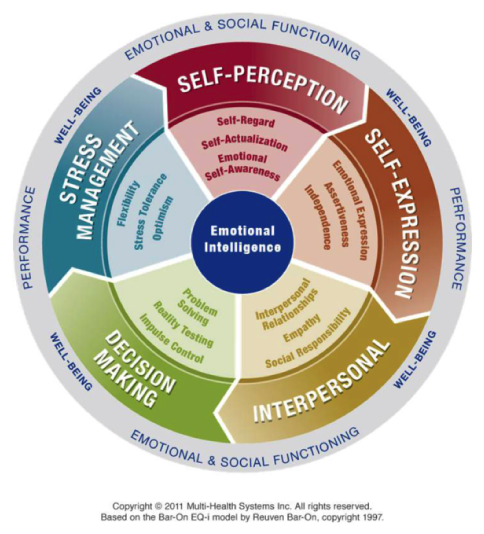What is Emotional Intelligence (EQ)?
Emotional Intelligence is “a set of emotional and social skills that influence the way we perceive and express ourselves, develop and maintain social relationships, cope with challenges, and use emotional information in an effective and meaningful way.” Emotional intelligence (EQ) as defined here reflects one’s overall well-being and ability to succeed in life.
Importance of Emotional Intelligence
Why is EQ important?
While emotional intelligence isn’t the sole predictor of human performance and development potential, it is proven to be a key indicator in these areas. Emotional intelligence is also not a static factor — to the contrary, one’s emotional intelligence can change over time and can be developed in targeted areas.
The EQ-i 2.0 instrument measures emotional intelligence (EQ) and how it can impact people and the workplace.
Applications of EQ include:
What is the EQ-i 2.o?
EQ-i: Emotional Quotient Inventory
The EQ-i®: is the first scientifically validated emotional intelligence tool in the world.
The EQ-i 2.0 measures an individual’s emotional intelligence (EQ) and how it can impact people and the workplace.
the EQ-i 2.0 features one overarching EQ score (Total EQ), broken down into five composite scores which, in turn, are broken down into a total of 15 subscales.
The EQ-i 2.0® Model

Applying Emotional Intelligence
Human skill and ingenuity provide the essential building blocks of business success. Yet the effective management of assets so complex can prove elusive. The most commonly considered performance predictors—intelligence, education, experience, and personality—are, quite simply, not enough. How often do judgements formed on the basis of a candidate’s academic achievement, formal qualifications, and employment record prove flawed? The key predictor missing from this list used to be regarded as an intangible something but has now been identified by a large and growing body of international social scientific research as Emotional Intelligence.
Emotionally intelligent people communicate effectively, form strong relationships and create powerful coping strategies; emotionally unintelligent people don’t—no matter how high their IQs. Emotional Intelligence can be measured—more reliably and less controversially than IQ—and, unlike IQ, it can be substantially strengthened and developed.
Employee Development
The EQ-i 2.0 measures the interaction between a person and the environment he/she operates in. Assessing and evaluating an individual’s emotional intelligence can help establish the need for targeted development programs and measures. This, in turn, can lead to dramatic increases in the person’s performance, interaction with others, and leadership potential. The development potentials the EQ-i 2.0 identifies, along with the targeted strategies it provides, make it a highly effective employee development tool.
Leadership Development
As most experienced leaders are acutely aware, social and emotional competencies are critical to managerial success. Our tools, along with specialized offerings like the EQ-i Leadership Report, have helped organizations formulate clear profiles and development plans for up-and-coming leaders.
Download our brochure to learn more about EQ and Leadership Development
DownloadDevelopment
Emotional Intelligence is elastic. Those who lack it can acquire it; those who have it can enhance it.
Emotional Intelligence tests identify areas of strength and weakness that training and coaching can be designed around. People at every level of the organization, from new hires to senior managers, can develop their emotional intelligence skills and see their job performance improve significantly.
Supplemented by other sources of information, such as interviews, the EQ-i 2.0 can make the recruitment and selection process more reliable and efficient. A sound recruiting process leads to higher retention rates and reduced turnover which can result in significant cost savings, improved employee effectiveness and increased morale
Download our brochure to learn how EQ-i helps you recruit top talent
Download



